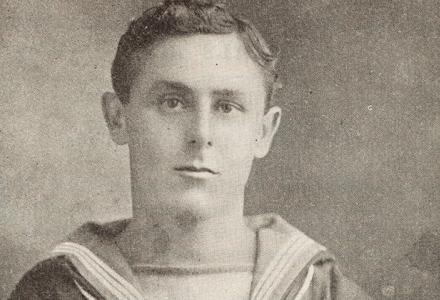Bernhardt Hermann Walther enlisted in Perth at the outbreak of the war. His grandfather had immigrated to Australia from Germany in the 1840s. Bernie was blonde, blue-eyed, and shared his grandfather's love of music and chess. The family had been farmers, first in the Wimmera, and then in the West. Bernhardt’s father Johann devoted all he could to his only son's education. The lad attended Perth Boys’ State School, trained in accountancy and secured a job in the public service. Like the grandchild of many an immigrant, Bernie had made good.
Private Bernhardt Walther sailed to war on the first contingent to leave Australia. He was just nineteen when he boarded the ship. Normally the Ascanius had accommodation for two hundred passengers. When she sailed from Fremantle, there were 2,004 men crammed between her decks, along with supplies, munitions and horses, three kangaroos, one cockatoo and four nurses.
Bernie was amongst the first ashore at Anzac; eight months later he was amongst the last to leave. He went on to France and within eighteen months had risen through the ranks from private to captain. Bernhardt Walther had climbed the pyramids in Egypt, toured the countryside of England, and drunk red wine in the estaminets of France. But what some called ‘the charmed life’ of Captain Walton would not last forever. Bernie was shot in the abdomen at Pozières in July 1916. It took him three days to die. He was twenty-one years of age.
It was not until November that the family learned of their son's death. Vera Deakin of the Red Cross wrote to them, promised Bernie had not suffered ’much pain’, and described a distant grave marked by a sturdy wooden cross. Johann knew his son had served with distinction in the First AIF. And he knew Bernhardt had given his life for what was his native land. But Johann was of German parentage. He was considered by many to be an enemy alien. Many in Australia’s German community faced persecution and rejection every day of the war.
Bernhardt Walther’s story reminds us of the ‘enemy within’ that haunted wartime Australia. With the fighting so far away, it seemed necessary to manufacture a threat closer to home and those of German descent were often deemed disloyal to Australia. Men who served in the AIF were no exception to this. Bernhardt Walther gave his life for his country. Some would say his country rejected him.
For full attribution of sources, suggestions for further reading and an extended version of the story itself see ‘Amongst the first ashore at Anzac: Bernhardt Walther’ in Bruce Scates, Rebecca Wheatley and Laura James, World War One: A History in 100 stories (Melbourne, Penguin/Viking, 2015) pp. 129-132; 357.



